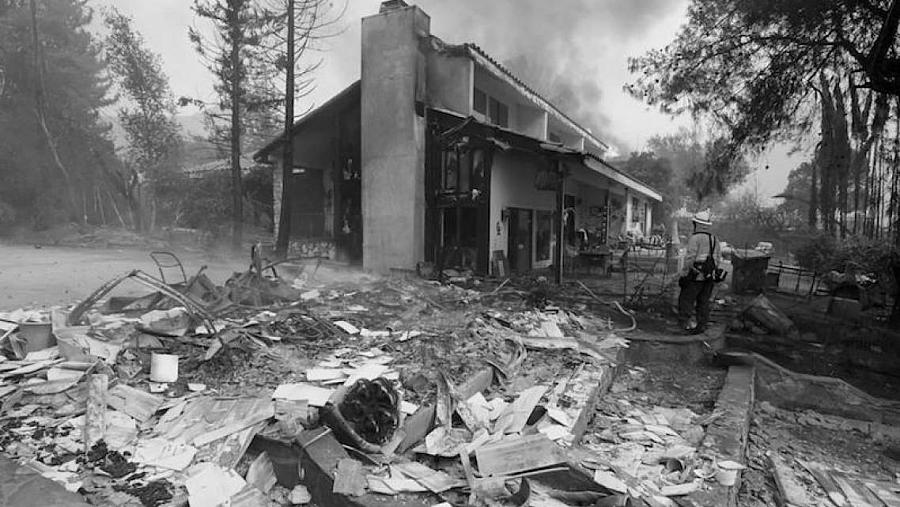Domestic workers adapt lessons learned during wildfires to COVID-19 pandemic

(Photo by Ringo H.W. Chiu)
One morning back in May, a group of domestic workers and day laborers met at a Dollar Tree parking lot in Santa Rosa. For the most part, they stayed in their cars. Some people flew Mexican flags out of their car windows, tied star-spangled balloons to their antennas, or decorated their windshields with papel picados. Almost everyone wore a homemade surgical mask. They were attending the “May Day Car Caravan for Immigrant & Worker Rights,” a protest designed to advocate for basic labor protections while keeping workers safe from the COVID-19 pandemic. When the protesters drove en masse to Sacramento, I followed along as they live streamed on Facebook and virtually protested working conditions on Zoom.
Over the past year, I have been investigating how California’s wildfires impact the health and safety of low-wage immigrant workers. In that period of time, the story I’m covering has never stopped changing, and my reporting approach has changed with it. Domestic workers and their allies are applying lessons learned during California’s wildfires to other disasters, and as conditions on the ground force them to change their political strategy, I’m adapting with them.
For low-wage immigrants, fire season brings its own dangers. When a wildfire burns through a California neighborhood, the housekeepers and gardeners who work there lose jobs they rely on, and some workers are recruited for new jobs that could jeopardize their health. I’ve interviewed multiple domestic workers who shoveled ash out of burnt out houses. Wildfire ash can be toxic, but their employers did not supply them with N95 masks or basic protective gear. They also didn’t have to. Domestic workers are exempt from Cal/OSHA and are not covered by California health and safety laws.
“The ash flies in your face and hair, it covers your whole body,” one worker told me. “I realized that the ash was bad for me, and for my body, for my organs, for my lungs. But I needed the money. I needed to work.” She cleaned a large house in Malibu without any protection for her face, eyes, or skin, for three straight days, until her chest hurt and her lungs ached.
We don’t know how often domestic workers get roped into wildfire cleanup work. But workers, state officials, and labor organizers across the state describe a similar pattern. The most extensive research on this issue was compiled by el Instituto de Educación Popular del Sur de California (IDEPSCA), a non-profit that works with low-wage immigrant workers in the Los Angeles area. Funded by a grant from United Way LA, the organization surveyed over 500 low-wage immigrant workers about their experience during the 2018 Woolsey Fire. According to IDEPSCA’s program manager, Nancy Zuniga, over 50 domestic workers described deep-cleaning homes without masks, gloves or other basic safety gear.
Domestic workers are pushing back against these dangerous working conditions with statewide political organizing. In February, the California Domestic Workers Coalition successfully pushed for new legislation that would address these conditions. Introduced by State Senator Maria Elena Durazo, the Health and Safety for All Workers Act (SB 1257) would extend Cal/OSHA coverage to domestic workers once and for all. The bill passed the legislature on Aug. 30 and now awaits the governor's signature.
The COVID-19 pandemic has made advocating for this legislation more challenging. When I talked to Graton Day Labor Center director Christy Lubin last March, she told me that “at least 90 percent” of the workers she partnered with had lost their jobs during shelter-in-place. And in addition to workers’ serious economic concerns, political organizing became more challenging. Protests shifted to car caravans. Meetings shifted to Facebook live and Zoom in a community where not everyone has a stable internet connection.
But domestic workers also told me the pandemic strengthened their resolve, and that it demonstrates just how important the Health and Safety for All Workers Act really is. For some low-wage immigrant workers who’ve been through wildfires, the pandemic has followed a familiar pattern. Domestic workers have lost jobs they rely on, and those who are still employed, like in-home caregivers, are risking their health to go to work. Day labor centers and other advocacy organizations are keeping track of employers who hire domestic workers without offering them basic protective gear.
Domestic Worker Coalition director Kim Alvarenga says her organization considered stepping back from their legislative agenda this year. It felt like workers were already going through enough.
"We had a hundred members on a call and asked them, ‘is this the time to pursue this, considering the financial crisis you all are going through?'" She says. "And they overwhelmingly came back and said to us, ‘there is no time but now. Our lives depend on it. Like, these health crises and these natural disasters are going to happen again.'"
If we want better labor protections during California's next major disaster, workers argued, we'd better start fighting for them now.

